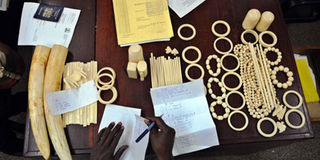Kenya a ‘major route for ivory smugglers’

PHOTO | TONY KARUMBA | FILE A police officer catalogues illegal ivory ornaments and tusks seized from four Chinese nationals in Nairobi on January 29, 2013.
What you need to know:
- Report shows Kenya and Tanzania accounted for most of the ivory seized between 2009 and 2011
Kenya has been named as one of the major exit points in Africa for illicit ivory trade, which has been on an upward trend for the last six years.
A new report says other countries favoured by ivory smugglers are Tanzania and South Africa.
The study shows that transit locations along the way to the destination countries are Hong Kong, Malaysia, the Philippines and Vietnam.
Statistics by the Elephant Trade Information System (ETIS) indicate that Kenya and Tanzania together accounted for 16 of the 34 large-scale ivory seizure cases recorded from 2009 through 2011.
The total volume of ivory seized was 35 tonnes and accounts for 58 per cent of the consignment impounded during this period.
According to the report, elephants face the worst conservation crisis since the 1989 trade ban was imposed under the Convention on International Trade in Endangered Species of Wild Fauna and Flora.
The findings revealed in the report, Elephants in the Dust; The African Elephant Crisis, notes that the weight of ivory, whose main destination points are China and Thailand, is now roughly three times greater than it was in 1998.
ETIS cites an additional 10 countries and territories as areas of concern because they are also sources of ivory, transit points or domestic markets for the illicit trade.
These include Cameroon, Congo, the Democratic Republic of Congo, Egypt, Ethiopia, Gabon, Mozambique, Nigeria, Uganda and Taiwan.
The report says more ivory is moving through these countries currently than in other parts of Africa.
It adds that all along the trade chains, organised criminal syndicates are an active force undermining international and national regulations that prevent trade in ivory.
In March, ETIS official Tom Milliken told the annual Convention on Trade in Endangered Species (Cites) conference in Bangkok that Kenya and seven other nations risked being slapped with sanctions after an international lobby group accused them of condoning the sale of elephant tusks.
He said the nations at the heart of an unprecedented rise in African elephant killings must be hit with heavy trade sanctions.
According to the report, corruption and weak governance structures in the mentioned countries had worsened the situation.
In January, a Nairobi court said lack of stiff penalties “fuels ivory trade” and blamed the increase in poaching on the absence of stringent punishment for offenders.
Makadara senior principal magistrate Tom Okello made the remarks as he fined four Chinese traders Sh120,000 each for being in illegal possession of ivory ornaments worth Sh4.9 million.
Since its introduction, ETIS has initiated the use of law enforcement data to track illegal trade in ivory. “The ETIS data represents the largest collection of elephant product seizure records in the world, with over 19,000 cases as of January 2013,” the reports reads in part.




